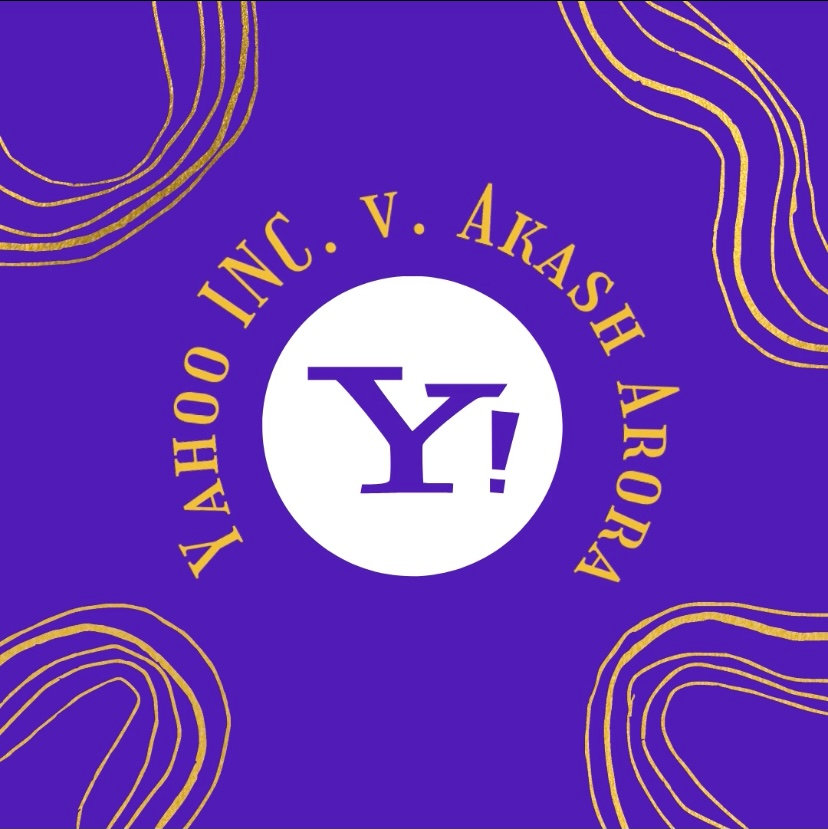Introduction
The issue at hand is a significant example of cybersquatting in India. Cybersquatting involves registering a well-known brand or business name as a domain name to drive traffic and increase earnings. The case arose when Akash Arora registered the domain “Yahoolndia,” which closely resembled the trademark “Yahoo!,” a brand with a strong reputation and goodwill. Users were signing up for Yahoolndia, which offered services similar to Yahoo, engaging in the practice of passing off.
Facts of the Case
The plaintiff, Yahoo Inc., owned the trademark “Yahoo” and the domain name “yahoo.com,” both well-known and recognized globally. Yahoo, established in 1995, held trademark registrations in 69 countries except India, with headquarters in Sunnyvale, California.
Case Background
The defendant, Akash Arora, registered “Yahoo India” to provide internet services similar to Yahoo Inc. Yahoo Inc. filed for an interim injunction to prevent the defendant from using the “yahooindia.com” domain or any name similar to its trademark. Yahoo Inc. sued Akash Arora for using a confusingly similar trademark and attempting to pass off his services as those of Yahoo Inc.
Brief History
Yahoo Inc. sought a permanent injunction to stop the defendants and their associates from using the “Yahooindia.com” domain or any similar mark. Additionally, they requested an ad interim temporary injunction to prevent the defendants from operating any business under the disputed domain name during the trial.
Issues
- Does intellectual property law protect domain names?
- Does registering “Yahoo India” constitute passing off services as those of Yahoo Inc. and infringe upon the plaintiff’s trademark under the Trade and Merchandise Marks Act?
Petitioner’s Contention
The plaintiff’s counsel argued that “Yahoo!” and “Yahoo.com” had acquired distinct reputation and goodwill. The defendants, by adopting the name “Yahooindia” for similar services, were passing off their services as those of Yahoo Inc. The plaintiff contended that domain names function as trademarks and are entitled to protection against passing off.
Defendant’s Contention
The defendant’s counsel argued that Indian trademark rules apply to products, not services, and the Trade Marks Act did not cover this case. They also noted that “Yahoo!” was not registered as a trademark in India, making infringement claims invalid. The defense claimed that “Yahoo!” is a general dictionary word and not distinctive. They also argued that internet users were unlikely to be deceived due to disclaimers and their technological literacy.
Judgement
The court concluded that Akash Arora infringed the “Yahoo” trademark by using a confusingly similar domain name while offering similar services. The court issued a restraining order, preventing the defendant from using “yahooindia.com.” The judgment emphasized the reputational value of a company’s name and trademark, especially for Yahoo Inc. Consequently, the defendant was ordered to cease using the disputed domain name.
Analysis
The case “Yahoo Inc. v. Akash Arora” is a landmark in the context of cybersquatting in India. It marked the first time the Delhi High Court recognized domain names as entitled to the same legal protection as trademarks. The case highlighted critical intellectual property issues, including the applicability of Sections 29 and 27 of the Trade and Merchandise Marks Act. Before this judgment, domain names faced legal uncertainties in trademark registration. The ruling established that domain names could serve as trademarks if they met the distinctiveness criteria, allowing courts to prevent the use of confusingly similar marks. This interpretation ensured that businesses could not mislead the public by using names similar to established trademarks.
